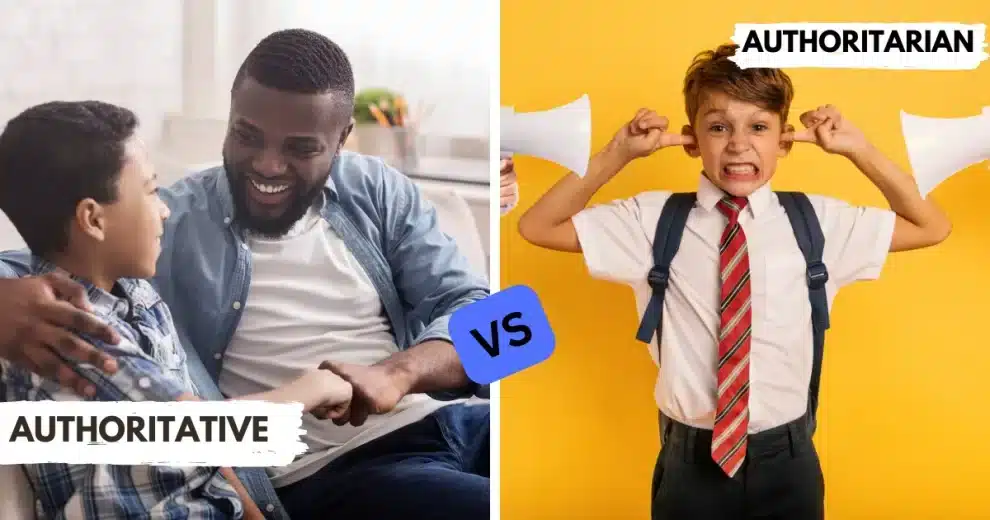Authoritarian vs. Authoritative: The Impacts of Parenting Styles on Today’s Kids
Table of Contents
Did you know how you parent your children can significantly shape your child’s future? Of course, you’re probably aware of nature vs. nurture and how that can impact your child. And our nurturing indeed plays a significant role in childhood development. But the truth is, there is more to it than that. Understanding the impact of parenting styles is crucial in helping your child thrive in today’s world.
Two common approaches, authoritative parenting, and authoritarian parenting, can profoundly affect how kids develop. Let’s delve into these styles and discover why comprehending them is vital for nurturing our children’s potential and wellbeing.
What are the 4 Major Parenting Styles?
According to an article by StatPearls, when it comes to parenting, the diversity among families is vast. As parents, we all have a unique approach to interacting with and guiding our children, influenced by our cultural backgrounds and personal beliefs. This diversity reflects the rich tapestry of parenting styles seen worldwide. These styles are crucial in shaping a child’s morals, principles, and behavior.
Over the years, researchers have identified four primary parenting styles: authoritarian, authoritative, permissive, and uninvolved. Let’s explore each style and gain insights into its distinct characteristics. And to help, I consulted with psychologist Francyne Zeltser, Director of Mental Health Services at Manhattan Psychology Group in New York City.
1. Authoritarian Parenting
Authoritarian parenting emphasizes strict rules, discipline, and high expectations. Parents who adopt this approach tend to be controlling and demanding. Children raised under authoritarian parenting typically do what they are told without question, but may face challenges in developing autonomy and decision-making skills. Zeltser says, “In an authoritarian environment, the communication arrow goes from parent to child. The parent tells the child what to do and what is expected of them, and the expectation is that the child does it [without question]. No ifs, ands, or buts about it.”
2. Authoritative Parenting
Authoritative parenting on the other hand, is characterized by a balance of rules, warmth, and open communication. Rules and limits are clear, and the children know what consequences to expect for infractions. As a result, children raised under authoritative parenting tend to develop self-reliance, social competence, and a strong sense of self-esteem. “In the authoritative parenting style, the communication arrow goes both directions, like a continuous loop. There is ongoing dialogue supported by respect, understanding, and explanation. When a child is told to do something, they are given an explanation as to why. If the child is not readily agreeable to what is asked, the parents take the time to understand the child’s questions or concerns so that they can further expand on their ask,” Zeltser explains.
“This doesn’t mean that kids get to do as they wish. In the authoritative parenting style, the parents demonstrate a high degree of control, while offering their children respect and understanding. Authoritative parents are open to having a conversation and finding middle ground when it comes to their expectations.”
3. Permissive Parenting
Permissive parents adopt a lenient and indulgent approach, granting their children a high degree of freedom with minimal discipline. Permissive parents prioritize the desires of their kids, granting them considerable autonomy to avoid confrontations. Instead of imposing many rules, they let their kids figure out things independently. While allowing children to solve their own problems can have benefits, the fact is that permissive parents often act more like friends than authority figures. As a result, children raised under permissive parenting may face challenges with self-control, have difficulty following rules, and exhibit tendencies of entitlement.
4. Uninvolved Parenting
Uninvolved parents demonstrate minimal emotional involvement or responsiveness toward their children’s needs. They often prioritize their own interests over their child’s well-being and provide little guidance or support. Consequently, children raised under uninvolved parenting may experience emotional neglect, have lower self-esteem, and encounter challenges in various areas of their development.
The Differences Between Authoritative vs. Authoritarian Parenting Styles
When it comes to parenting styles, the approaches we take can significantly impact our children’s development. Two widely discussed styles are authoritative and authoritarian parenting. While both styles involve setting expectations and limits, their underlying principles and effects on kids differ significantly.
Exploring Authoritative Parenting

When it comes to discipline, they apply it fairly and discuss the reasoning behind the discipline and how to modify behavior in the future. They also acknowledge children’s rights and respect individual differences, consistently conveying caring, love, and warmth.
An article published by Michigan State University discussing authoritative parents describes them as those that carefully define limits for children, are good role models and praise children for their efforts. The article goes on to explain that this parenting style involves the following:
- Establishing reasonable expectations for their children, recognizing the importance of meaningful experiences and allowing freedom for exploration and skill development.
- Acknowledging that not every stressful situation requires immediate parental intervention, understanding that minor frustrations can serve as opportunities for developing coping skills.
- Emphasizing that experiencing setbacks and failures is a normal part of childhood growth, similar to how teenagers may need to navigate the end of romantic relationships to foster emotional maturity required for lasting connections.
- Teaching children how to handle and manage frustrations and challenging experiences from a young age, equipping them with the necessary tools to navigate situations independently during their teenage years when they rely more on peers and others for guidance.
- Promoting independence and self-reliance, empowering children to realize their own capabilities and instilling confidence in their ability to accomplish tasks on their own.
Kids Raised in an Authoritative Parenting Environment Are More Often Independent and Self-Reliant
Kids raised in an authoritative parenting environment tend to have the following characteristics:
- Independent and self-reliant
- Socially accepted and capable of building positive relationships
- Academic success and motivation
- Well-behaved with reasonable emotional control and regulation
- Happier disposition and positive outlook on life
Authoritative parenting is generally associated with favorable outcomes for children. In the interview with me on behalf of More4Kids, Zeltser explained that “Children of authoritative parents tend to demonstrate more assertiveness and social confidence. They are often high-performers in school, autonomous thinkers, demonstrate emotional stability, and endorse having a higher level of life satisfaction than children parented under the authoritarian style.”
By balancing setting expectations and providing support, authoritative parents can foster the development of their child’s autonomy, competence, and well-being.
Exploring Authoritarian Parenting

According to an article published by Michigan State University, the authoritarian parent is the the “because I told you so” parent who will likely degrade a child and ignore the child’s point of view. Here are some of the characteristics of authoritarian parenting:
- Adherence to strict and non-negotiable rules, with harsh and punitive punishments for non-compliance
- Lack of explanation for the rules, often relying on phrases like “Because I said so!”
- Parents equating obedience with love, prioritizing compliance over open communication
- Limited opportunities for open dialogue or expression of thoughts and feelings
- Experiencing complete control exerted by parents, with little room for compromise or flexibility
Kids Raised in an Authoritarian Parenting Environment Often Struggle with Self-Control and Decision Making
Kids raised in an authoritarian parenting environment tend to have the following characteristics:
- Conform easily and have a strong relational dependence
- Associate obedience and success with love
- Struggle with self-control and decision-making
- Experience a strong sense of failure and low self-esteem
- Have difficulties in social situations, lacking social competence, displaying inappropriate aggressive or risky behavior outside of the home, and exhibiting fearfulness or excessive shyness
- May suffer from depression, stress and anxiety
While authoritarian parenting may produce children who conform and excel in specific areas, such as obedience and goal attainment, there are potential negative consequences associated with this style. Zeltser indicated that kids raised in an authoritarian environment are often insecure and withdrawn. “These kids are afraid to make mistakes because they might get yelled at. They are more likely to show signs of mental illness such as depression and anxiety, which correlate with higher rates of substance use, likely as a self-medicating or coping mechanism to deal with that depression and anxiety. Further, these kids tend to have poor academic performance compared to kids raised in an authoritative parenting situation.”
Ultimately, there are few pros of authoritarian parenting and kids raised by authoritarian parents often struggle with self-control, decision-making, and social competence. The lack of guidance in managing anger and low self-esteem can contribute to difficulties in emotional regulation. Additionally, strict rules and punishments can lead to a rebellious attitude towards authority figures as children grow older. This can make relationships with their teachers, members of clergy, and other leaders more challenging.
What influences your parenting style?
As we work to understand the various styles of parenting, it begs the question, ‘what factors in my life influence the type of parenting style I use with my kids?” The truth is that parenting styles are shaped by a variety of factors that influence how we interact with and raise our children. Understanding these factors can provide valuable insights into why we adopt certain parenting styles.
Factors that influence your specific style of parenting include:
- Your own upbringing and parental role models – Parents often emulate the parenting styles they experienced during their own upbringing. They may adopt similar approaches or consciously strive to avoid repeating negative patterns they observed in their own parents.
- Your cultural background – Culture plays a significant role in shaping parenting styles. Different cultures have distinct values, norms, and expectations surrounding child-rearing. Parenting practices are often influenced by cultural beliefs, traditions, and societal norms.
- Your personal beliefs and values – Individual beliefs and values strongly influence parenting styles. Factors such as religious beliefs, personal philosophies, and moral values impact how parents approach discipline, autonomy, and the overall upbringing of their children.
- Your socioeconomic status – Socioeconomic status can influence parenting styles. Economic factors, such as financial stability or instability, access to resources, and educational opportunities, can shape parents’ parenting choices and priorities.
- Your child’s own characteristics and personality traits – The unique characteristics of each child can impact parenting styles. Some children may require more structure and guidance, while others may thrive with more independence. Parenting styles may be adapted to meet the specific needs, temperament, and development of each child.
- Your own stress and support – The level of stress and support experienced by parents can influence their parenting styles. High levels of stress, lack of support, and challenging life circumstances may impact parenting approaches, affecting the consistency, warmth, and responsiveness of parents.
- Your education and knowledge – Parental education and knowledge about child development can influence parenting styles. Understanding child development stages, effective discipline strategies, and age-appropriate expectations can shape the way parents interact and guide their children.
Zeltser shared that “While parents can practice any of the parenting styles, in my experience I have seen that parents raising their kids in multi-generational homes are more likely to follow an authoritarian approach, especially if they were raised by authoritarian parents.
This is because the parents and grandparents in these families share the parenting responsibilities. Today’s grandparents likely applied an authoritarian approach to parenting, as this was normal for their generation. And, they are likely to apply that same approach when caring for their grandkids. When mom and dad come home, it is challenging for them to parent authoritatively, and often, when they try to do so, their own parents start to shame them, invalidating the way they are parenting.”
Can parents shift between parenting styles?
As I conducted the research for this article and conversed with Dr. Zeltser, I’ll admit that I saw some of my own traits reflected across parenting styles. And this made me question if parents can shift between parenting styles. It also made me question what type of parent I identify as, both when my kids were young and now that they are adults.
What type of parent do you identify as? Do you fall into the category of an authoritarian parent, setting rigid rules and demanding unquestioning obedience? Or perhaps you lean towards being a helicopter parent, constantly hovering nearby, ready to address any need or issue that arises in an instant? For me, I feel like I fall somewhere in the middle.
Zeltser says, “It’s important for parents to realize that parenting is not all or nothing. Let’s compare parenting to eating…Many of us strive to eat healthy to protect our overall well being. We know that eating healthy is good for us, and so most of the time, that’s what we aim to do. But, on occasion, we let ourselves have a snack or we indulge in something that would be considered not healthy. But those instances don’t make us unhealthy eaters.”
Zeltser goes on to explain that “Parents should move away from that black or white style of thinking. It isn’t productive and can create feelings of shame. Most parents strive to approach parenting from an authoritative point of view since we know that this style of parenting leads to successful and resilient children. But that doesn’t mean we won’t act in an authoritarian manner every once in a while.”
Authoritative vs. Authoritarian: Making Informed Parenting Choices for Your Child’s Future
In the journey of parenthood, understanding the differences between authoritative and authoritarian parenting styles can play a crucial role in shaping our children’s future. While both styles have distinct characteristics and effects, it is essential to recognize that no single approach fits all situations or children.
By being aware of the impact of our parenting styles and considering the needs of our children, we can strive to create a nurturing and empowering environment that promotes their overall well-being, independence, and healthy development. As Zeltser says, “Change is hard, no matter where you are in your life. And these changes can create parental stress, which makes parenting even more difficult. More demands at work. Struggles to balance responsibilities. It all adds up. And there is no such thing as a perfect parent, not even the authoritative parent! However, acknowledging the mistakes we make as parents, and treating our kids with compassion and respect, can go a long way in creating well-adjusted, healthy, and happy kids.”
Making informed parenting choices allows us to cultivate strong parent-child relationships and set the foundation for our children’s future success and happiness.
Authoritative vs Authoritarian Parenting Comparison
| Feature | Authoritative Parenting | Authoritarian Parenting |
|---|---|---|
| Communication | Open and two-way | One-way, from parent to child |
| Discipline Style | Reasoning and explanation | Strict rules and punishment |
| Emotional Warmth | High, nurturing | Low, less affectionate |
| Expectations of Maturity | Reasonable | High |
| Flexibility | Adaptable to child’s needs | Rigid and inflexible |
| Freedom Given to Child | Moderate | Limited |
| Parental Control | Balanced | High |
| Problem-Solving | Encourages child’s input | Parent decides |
| Responsiveness | High | Low |
| Rules and Guidelines | Clear but open to discussion | Fixed, no discussion allowed |
| Unconditional Love | Yes | Conditional on obedience |
| Encouragement of Independence | Yes | No |
| Use of Time-outs | Occasionally | Rarely |
| Listening Skills | Actively listens to child | Minimal listening |
| Validation of Child’s Feelings | Yes | No |
| Teaching of Emotional Skills | Yes | No |
| Involvement in Child’s Life | High | Moderate to Low |
| Use of Positive Reinforcement | Frequent | Rare |
| Setting of Healthy Boundaries | Yes | Boundaries often too strict |
| Respect for Child’s Opinions | Yes | No |
| Quality of Time Spent Together | High | Variable |
| Encouragement of Social Skills | Yes | Limited |
| Approach to Mistakes | Seen as learning opportunities | Seen as bad behavior |
| Conflict Resolution | Democratic methods | Dictatorial methods |
| Role Modeling | Positive role models | Inconsistent role modeling |
Frequently Asked Questions
What is the difference between authoritarian and authoritative parenting styles?
Authoritarian parenting emphasizes strict rules, discipline, and high expectations, with parents controlling and demanding obedience without question. In contrast, authoritative parenting balances rules, warmth, and open communication. It involves setting clear rules and consequences but also encourages dialogue and understanding.
What are the impacts of authoritarian and authoritative parenting on children?
Children raised under authoritarian parenting may face challenges in developing autonomy and decision-making skills. They often associate obedience and success with love, struggle with self-control, and may have low self-esteem. On the other hand, children raised under authoritative parenting tend to develop self-reliance, social competence, and a strong sense of self-esteem. They are often independent, socially accepted, and have a positive outlook on life.
What are the four major parenting styles?
The four major parenting styles are authoritarian, authoritative, permissive, and uninvolved. Each style has distinct characteristics and impacts on a child’s development.
What factors influence a person’s parenting style?
Factors that influence a person’s parenting style include their own upbringing and parental role models, cultural background, personal beliefs and values, socioeconomic status, their child’s own characteristics and personality traits, their own stress and support levels, and their education and knowledge about child development.
Can parents shift between parenting styles?
Yes, parents can shift between parenting styles. Parenting is not all or nothing, and it’s normal for parents to exhibit traits from different styles at different times. However, it’s generally beneficial to strive for an authoritative approach, which is associated with successful and resilient children.













Add Comment